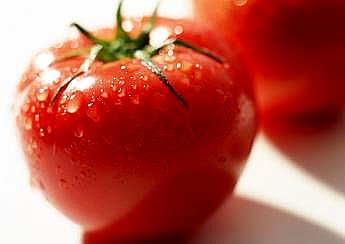The "hormone" is ethylene gas, the same gas that some produce gives off naturally, its a naturally occurring plant hormone. The gas is always present around ripening fruit. Its done with many fruits and veggies, mangoes, tomatoes, apples, ect. all these fruits give off ethylene, if they had been left on the vine they would have produce the ethylene themselves and ripened.
Buying Local Produce Gives Anyone The Power Of Change
Buy local and live free.
The food industry is consolidating at an alarming rate. The top companies producing meats, grains, and other staples now enjoy virtual control over the markets for their products.

Photo credit: Leonardo Novaes
It's gotten to the point where much of our nourishment depends on a handful of giants.
And they're shipping foods an average of 1500 miles to reach your plate, a practice that strains anyone's notion of "fresh."
But a quiet revolution is in the air, and we the eaters hold the power for change.
The typical Tom (tomato) is exhausted by the time he gets to market.
1500 miles from field to fork -- that's the trek made by the average fruit or vegetable these days. Because of the need to hold up over distances, our foods are bred, not for taste but for transport -- their ability to handle the long haul.
And what do we eaters get? Tired tomatoes.
Think also about all the oil consumed in getting that long-distance food to our supermarkets. Nine percent of America's total energy consumption is used to produce, process and transport our foods. Cheap oil, subsidized with our taxpayer dollars as well as with the mortgaging of our clean air and climate stability, is the foundation upon which the industrial food system has been built.
Fruits and vegetables like Local Lucy get their beauty and taste the old-fashioned way.
Local crops are bred for flavor, not mass production.
In fact, farmers raise a dazzling array of tomatoes, which not only have their
own unique tastes, but also carry traits that allow them to survive and adapt to
new pests and changing climates. Farmers are performing a heroic service by keeping these heirloom varieties alive.
More and more, our food is raised on huge farms, under terms set by distant corporations that control the process from gene to market.
And while we might spend less at the checkout stand, there are other costs
to pay, and no one escapes the bill.
Pesticide poisonings, rural towns on the ropes, the diminishing quality of our water and soil: these are just a few of the problems. Nothing symbolizes
what's wrong with this system as clearly as Traveling Tom, a tomato that's bred to be picked green and then gassed to redness.
Picked while green, Tom is gassed to redness.
In order to better survive the long journey to market, many tomatoes are picked while hard and green, then they're gassed with a hormone to help them
ripen. This is just one of the eye-opening practices that has become
commonplace in our industrial food system.
Others include: Factory chickens typically have their beaks clipped off
-- in the misery of their close confinement they would peck each other
violently. And farmed salmon are dyed pink -- changes in their diets
have caused them to lose their color.
We deserve something better than this.
An alternative is on the rise, led by Local Lucy, the tomato next door. One taste and you'll never go back. When you buy her and other foods raised near to home, more of your money makes it back to the farmer, helping to keep families on the land.
It's quite a ripple effect from the purchase of a simple tomato.
And there are a lot more good benefits than the few listed above.
Find out what a difference it makes to buy local produce at the open market (lucky if you still have one in your town) rather than buying at the corner supermarket.
Learn more about buying local by downloading the A Tale of Two Tomatoes by SectionZ manifesto, part of the ChangeThis series.
SectionZ works toward making our economy safe for people and nature. If we keep the planet, profit and the public good all in mind, there's no reason that one has to run roughshod over the others.
SectionZ aims to provide ideas with the power to change everything. Learn more online at http://sectionz.info.
A publication of Ecotrust. Learn more about Ecotrust's Food & Farm program.
Reference: ChangeThis [ Read more ]
| 2008-03-17 08:24:38 |
| 2005-01-18 12:29:30 |
solaroof.org - look at the Gallery - fits in with what you say!
| 2005-01-17 09:48:29 |
The situation may be even more serious than this article suggests. I just finished reading "The Food Bubble Economy" published by the Institute of Science in Society (ISIS).
Agriculture is not only losing the taste of what we eat, it may be sowing the seeds of future disaster. At least that is the theme of a book by Lester Brown of the Earth Policy Institute.
ISIS warns in their article that water is running low and that grain production has already dropped. The solution: sustainable agriculture, which would of course include growing the tasty Tom variety and consuming it locally. We really should take an interest in where our food comes from. See "The Food Bubble Economy".
